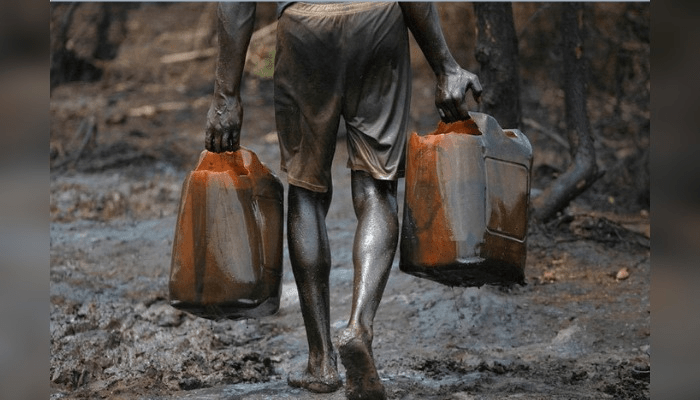The Nigeria Extractive Industries Transparency Initiative (NEITI) announced on Wednesday that Nigeria experienced a substantial loss of 619.7 million barrels of crude oil, equivalent to $46.16 billion or N16.25 trillion, due to theft and sabotage from 2009 to 2020. This loss amounted to a staggering daily decline of over 140,000 barrels of crude oil valued at $10.7 million.
NEITI further revealed that the government’s total revenue over the periods of 1999-2020 and 2006-2020 came to $741.48 billion from the oil and gas sector and N635.3 billion from the solid minerals sector, respectively.
The revelation emerged during a stakeholders’ roundtable held in Abuja to finalize the approval of the 2021 Industry Oil, Gas, and Solid Minerals Reports before their public release.
Dr. Ogbonnaya Orji, the executive secretary of NEITI, highlighted that, due to the absence of a board, the meeting sought the endorsement of other stakeholders following the submission of documents by independent administrators.
The global Extractive Industries Transparency Initiative (EITI) Standard mandates that the Multi Stakeholders Group (MSG) overseeing EITI reporting processes and implementation in countries must approve industry reports prior to their public release.
Orji recalled NEITI’s completion of 13 cycles of reconciliatory reports in the oil and gas sector and 11 cycles of reports in the solid minerals sector. He emphasized NEITI’s reporting on subsidy payments from 2005 to 2021 and the significant negative impact on the nation.
These reports highlighted that Nigeria had expended $74.39 billion, equivalent to N13.7 trillion, averaging N805.7 billion annually, N67.1 billion monthly, or N2.2 billion daily.
“After extensive consultation with the international secretariat, it was agreed that representatives of Companies, Civil Society, Media, and Government should be invited to review, deliberate, and approve the reports,” he remarked.
Regarding the upcoming reports set for official release next month, Orji detailed that the oil, gas, and mining sectors encompassed 69 companies, 12 government agencies, and a state-owned enterprise. Meanwhile, the solid minerals sector report covered 1214 companies and three government agencies.
Orji outlined the reports’ objectives, which aimed to establish mineral quantities produced and utilized in the country. Additionally, the reports aimed to ascertain the revenue paid by oil, gas, and mining companies, along with the actual amount received by the government.
NEITI’s focus areas also encompassed identifying investments made by the federation or federal government in the oil, gas, and mining sectors, tracking subsidy payments, company remittances, and liabilities.
“The processes followed, especially concerning the computation and remittance of all revenues payable to the government, such as taxes, royalties, and rents, are of great interest to NEITI,” he emphasized.
“We hope that after this review and approval process, the independent auditors who are part of this meeting will collaborate with NEITI staff to incorporate your comments, observations, and remarks in the reports before finalization and release,” he added.
“Our immediate priorities include releasing the 2020-2021 Oil, Gas, and Mining Reports and the Fiscal Allocation and Statutory Disbursement reports. This follows the approval we are seeking today from you, and we aim to conduct the 2022-2023 industry reports in the oil, gas, and mining sector,” he concluded.
Stakeholders attending the forum primarily represented the government, civil society organizations, extractive industries operators, and regulatory agencies.





